-
U.S. must address the “wicked problem” of wildfire
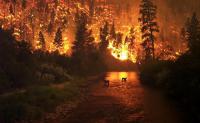
U.S. wildfires burned more than 10.1 million acres in 2015 — a new record. Wildfire suppression costs the United States, on average, $2.9 billion a year. Researchers say that the United States must make preparing for and adapting to wildfire a top national priority, recognizing that widfire is a “wicked problem” — one so complex that a one-size-fits-all solution does not exist.
-
-
Tools to help communities predict, cope with floods
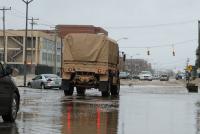
Anticipation and preparedness of large-scale flood events play a key role in mitigating their impacts and optimizing the strategic planning of water resources. Although many countries have well-established systems for river monitoring and early flood warning, an increasing number of inhabitants are affected by floods every year. The Global Flood Awareness System (GloFAS) has been set up providing an overview on upcoming flooding in large world river basins.
-
-
Human-induced climate change helped cause south of England floods: Scientists
Human-induced climate change increased the risk of severe storms like those that hit the south of England in the winter of 2013-14, causing devastating flooding and costing several people their lives. This is according to new analysis from an international team of climate scientists led by researchers at Oxford University.
-
-
Making slums more resilient to climate change

In our rapidly urbanizing world, access to sanitation, transportation, and other essential services remains a challenge for more than a billion people. In the world’s poorest and most vulnerable urban communities, finding new ways to meet these day-to-day human needs not only leads to sustainable development, it also fortifies them against the effects of climate-induced disasters.
-
-
Recent summer temperatures in Europe likely the warmest of the last 2 millennia
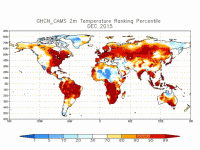
Most of Europe has experienced strong summer warming over the course of the past several decades, accompanied by severe heat waves in 2003, 2010, and 2015. New research now puts the current warmth in a 2,100-year historical context. The evidence suggests that past variability has been associated with large volcanic eruptions and changes in the amount of energy received from the sun, but that temperatures over the past thirty years lie outside the range of these natural variations, supporting the conclusion that recent warming is mainly caused by anthropogenic activity.
-
-
It is 3 minutes to midnight -- still

The Bulletin of the Atomic Scientists yesterday announced that the minute hand of the Bulletin’s closely watched Doomsday Clock will remain at three minutes to midnight, since recent progress in the Iran nuclear agreement and the Paris climate accord “constitute only small bright spots in a darker world situation full of potential for catastrophe.” The Bulletin’s panel of security experts said that “Three minutes (to midnight) is too close. Far too close…” – but that this reflects “world leaders continue to fail to focus their efforts and the world’s attention on reducing the extreme danger posed by nuclear weapons and climate change. When we call these dangers existential, that is exactly what we mean: They threaten the very existence of civilization and therefore should be the first order of business for leaders who care about their constituents and their countries.”
-
-
Record warm years almost certainly the result of human-made climate change
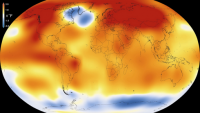
Recent record warm years are with extremely high likelihood caused by human-made climate change. Without greenhouse-gas emissions from burning coal and oil, the odds are vanishingly small that 13 out of the 15 warmest years ever measured would all have happened in the current, still young century. These odds are between 1 in 5,000 and 1 in 170,000, a new study by an international team of scientists now shows. Including the data for 2015, which came in after the study was completed, makes the odds even slimmer.
-
-
Northwestern enhancing local safety with new volunteer emergency response training
Northwestern University says it is enhancing its commitment to the safety of its students, faculty, staff, and visitors by launching a new training session of its Community Emergency Response Team (CERT) program for volunteers this April. The CERT program is a volunteer opportunity and training program for community members to help support preparedness activities, community welfare during major special events and organized community recovery efforts following a crisis.
-
-
Northeast braces for “snowpocalypse”
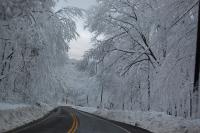
Around seventy-five million Americans are preparing for potentially life-threatening blizzard conditions as the season’s first major Atlantic Coast storm is about to sweep across the East Coast. Forecasters say the storm taking aim at Washington could rank among the biggest snowfalls on record, eclipsing the “Snowmageddon” storm of 2010 that dropped 45.2 cm. At least five states have declared emergencies as the potentially historic blizzard, which is expected to begin today (Friday), will likely dump up to 75 cm of snow in some regions.
-
-
Warmer oceans could produce more powerful, destructive superstorms
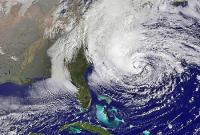
Hurricane Sandy became the second costliest hurricane to hit the United States when it blew ashore in October 2012, killing 159 people and inflicting $71 billion in damage. Informally known as a “superstorm” after it made landfall, Sandy was so destructive largely because of its unusual size and track. After moving north from the tropical waters where it spawned, Sandy turned out to sea before hooking back west, growing in size and crashing head-on into the East Coast, gaining strength when it merged with an eastbound mid-latitude storm. A new study led by the University of Maryland’s Earth System Science Interdisciplinary Center (ESSIC) suggests that a warmer Atlantic Ocean could substantially boost the destructive power of a future superstorm like Sandy.
-
-
Global ocean warming has doubled in recent decades
Changes in ocean heat storage are important because the ocean absorbs more than 90 percent of the Earth’s excess heat increase associated with global warming. Lawrence Livermore (LLNL) scientists, working with National Oceanic and Atmospheric Administration (NOAA) and university colleagues, have found that half of the global ocean heat content increase since 1865 has occurred over the past two decades. The observed ocean and atmosphere warming is a result of continuing greenhouse gas emissions.
-
-
Dead ETs: Aliens are silent because they are all extinct

Life on other planets would likely be brief and become extinct very quickly, say astrobiologists. In research aiming to understand how life might develop, the scientists realized new life would commonly die out due to runaway heating or cooling on their fledgling planets.
-
-
Mining social media improves disaster response efforts

Leveraging publicly available social media posts could help disaster response agencies quickly identify impacted areas in need of assistance, according to a team of researchers. By analyzing the September 2013 Colorado floods, researchers showed that a combination of remote sensing, Twitter and Flickr data could be used to identify flooded areas.
-
-
Earth’s 2015 surface temperatures the warmest since record keeping began in 1880

Earth’s 2015 surface temperatures were the warmest since modern record keeping began in 1880, according to independent analyses by NASA and the National Oceanic and Atmospheric Administration (NOAA). The 2015 temperatures continue a long-term warming trend, according to analyses by scientists at NASA’s Goddard Institute for Space Studies (GISS) in New York (GISTEMP). Most of the warming occurred in the past thirty years, with 15 of the 16 warmest years on record occurring since 2001. “Climate change is the challenge of our generation, and NASA’s vital work on this important issue affects every person on Earth,” said NASA administrator Charles Bolden.
-
-
Evaluating investments in community resilience
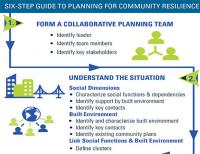
Communities weighing choices for capital improvement projects intended to improve their resilience to severe weather, wildfires, earthquakes, or other types of hazards now have a new guide to help them sort through the costs and benefits of each when deciding which investment is best for their particular circumstances. A new NIST report details steps for evaluating the “economic ramifications” of contemplated resilience investments as well as the option of maintaining the status quo.
-
More headlines
The long view
The Surprising Reasons Floods and Other Disasters Are Deadlier at Night
It’s not just that it’s dark and people are asleep. Urban sprawl, confirmation bias, and other factors can play a role.
Why Flash Flood Warnings Will Continue to Go Unheeded
Experts say local education and community support are key to conveying risk.
